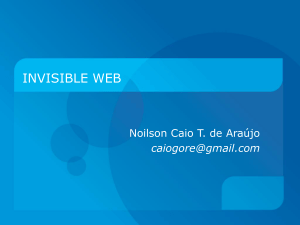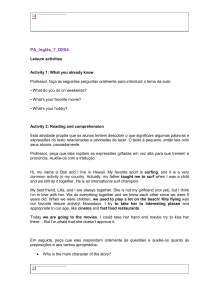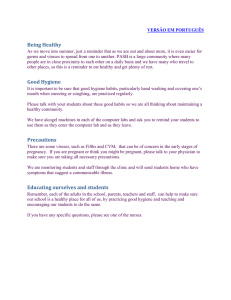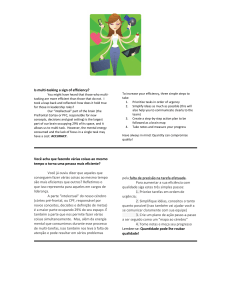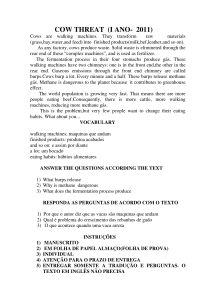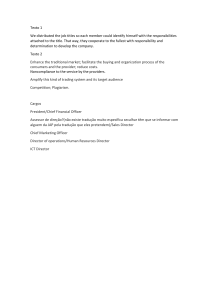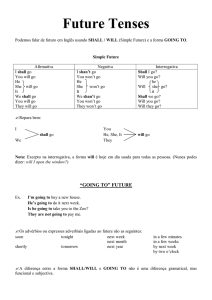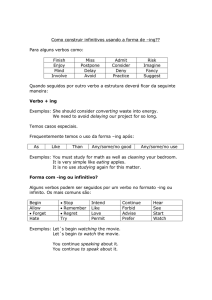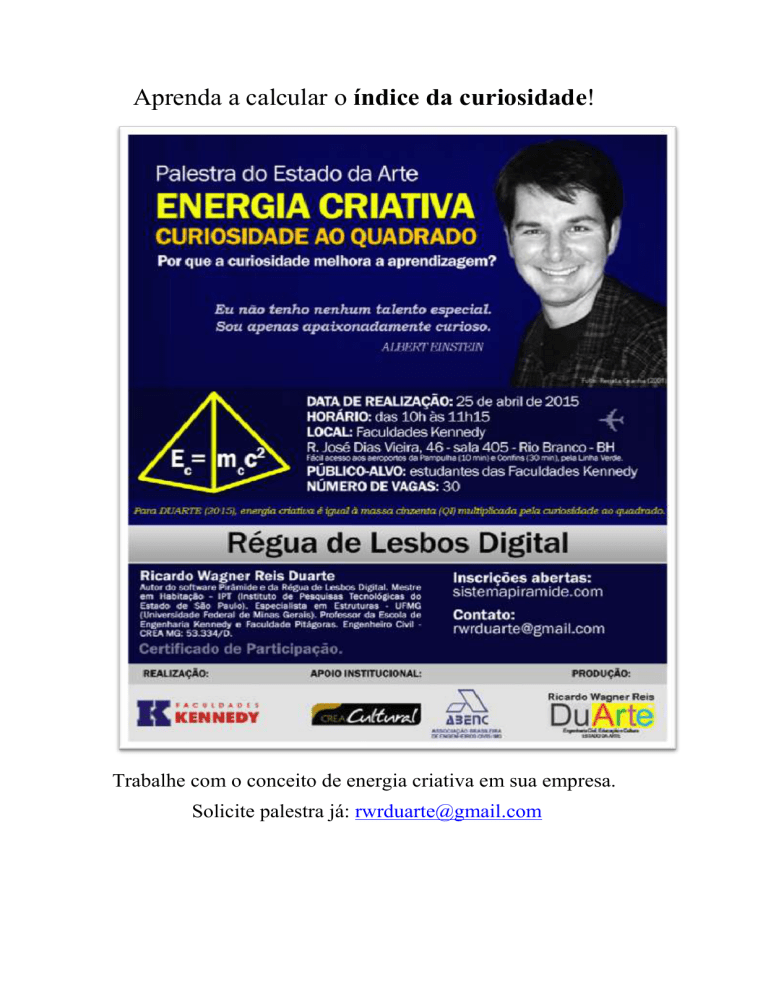
Aprenda a calcular o índice da curiosidade!
Trabalhe com o conceito de energia criativa em sua empresa.
Solicite palestra já: [email protected]
Why Curiosity Enhances Learning
DECEM BER 17, 2014
Share 554
8
"The important thing is not to stop questioning. Curiosity has its own reason for existing." -Albert Einstein
It's no secret that curiosity makes learning more effective and enjoyable. Curious students not
only ask questions, but also actively seek out the answers. Without curiosity, Sir Isaac Newton
would have never formulated the laws of physics, Alexander Fleming probably wouldn't have
discovered penicillin, and Marie Curie's pioneering research on radioactivity may not exist.
Instilling students with a strong desire to know or learn something is what every teacher lives
for, and research has even shown that curiosity is just as important as intelligence in
determining how well students do in school. But how much do we really know about its role in
the learning process?
Your Brain Likes Curiosity
Recently, researchers from the University of California, Davis conducted a series of experiments
to discover what exactly goes on in the brain when our curiosity is aroused. For the study, the
researchers had participants rate how curious they were to learn the answers to more than 100
trivia questions, such as "What Beatles single lasted longest on the charts, at 19 weeks?" or
"What does the term 'dinosaur' actually mean?" At certain points throughout the study, fMRI
scans were carried out to see what was happening in the brain when participants felt particularly
curious about the answer to a question.
So what did these experiments reveal? Here are two of the most important findings.
1. Curiosity prepares the brain for learning.
While it might be no big surprise that we're more likely to remember what we've learned when
the subject matter intrigues us, it turns out that curiosity also helps us learn information we don't
consider all that interesting or important.
The researchers found that, once the subjects' curiosity had been piqued by the right question,
they were better at learning and remembering completely unrelated information. One of the
study’s co-authors, Dr. Matthias Gruber, explains that this is because curiosity puts the brain in
a state that allows it to learn and retain any kind of information, like a vortex that sucks in what
you are motivated to learn, and also everything around it.
So if a teacher is able to arouse students' curiosity about something they're naturally motivated
to learn, they'll be better prepared to learn things that they would normally consider boring or
difficult. For instance, if a student struggles with math, personalizing math problems to match
their specific interests rather than using generic textbook questions could help them better
remember how to go about solving similar math problems in the future.
2. Curiosity makes subsequent learning more rewarding.
Aside from preparing the brain for learning, curiosity can also make learning a more rewarding
experience for students.
The researchers found that when the participants' curiosity had been sparked, there was not
only increased activity in the hippocampus, which is the region of the brain involved in the
creation of memories, but also in the brain circuit that is related to reward and pleasure. This
circuit is the same one that lights up when we get something we really like, such as candy or
money, and it relies on dopamine, a "feel-good" chemical that relays messages between
neurons and gives us a sort of high.
So not only will arousing students' curiosity help them remember lessons that might otherwise
go in one ear and out the other, but it can also make the learning experience as pleasurable as
ice cream or pocket money. Of course, most teachers already instinctively know the importance
of fostering inquisitive minds, but to have science back it up is undeniably satisfying.
Asking the Right Question
Naturally, there are still a few things that remain unclear about curiosity's role in learning. For
one thing, scientists have yet to determine its long-term effects. For instance, if a student's
curiosity is stimulated at the beginning of a school day, will it help them better absorb
information all day long? Another thing the researchers are keen to investigate is why some
people are more naturally curious than others, and which factors most influence how curious we
are.
For the moment, though, these findings serve as a reminder that there is no such thing as a
dumb question, because as cognitive scientist Daniel Willingham notes in his book Why Don't
Students Like School?, it's the question that stimulates curiosity -- being told the answer quells
curiosity before it can even get going.
So rather than jumping straight into the answers, let's try to start students off with the sort of
questions that encourage them to do their own seeking.
What questions tend to spark greater curiosity among your students?
Source: http://www.edutopia.org/blog/why-curiosity-enhances-learning-marianne-stenger
Por que a curiosidade melhora a
aprendizagem?
Estudo da Universidade da Califórnia mostra que manter os alunos
instigados é tão importante para o desempenho quanto inteligência
06/01/15 // ESCOLA
POR MARIANNE STENGER, DO EDUTOPIA
Não é nenhum segredo que a curiosidade torna o aprendizado mais eficaz e agradável.
Alunos curiosos não só fazem perguntas, mas também procuram ativamente as
respostas. Sem curiosidade Isaac Newton nunca teria formulado as leis da física,
Alexander Fleming, provavelmente, não teria descoberto a penicilina, e a pesquisa
pioneira Marie Curie sobre a radioatividade poderia não existir.
Incutir nos alunos um forte desejo de conhecer ou aprender alguma coisa é o que motiva
todo professor e pesquisas mostram que a curiosidade é tão importante quanto a
inteligência para determinar o quão bem os alunos vão na escola. Mas o quanto
realmente sabemos sobre o seu papel no processo de aprendizagem?
Crédito Jürgen Fälchle / Fotolia.com
Seu cérebro gosta de curiosidade
Recentemente, pesquisadores da Universidade da Califórnia, nos Estados Unidos,
conduziram uma série de experimentos para descobrir o que exatamente acontece no
cérebro quando a nossa curiosidade é despertada. Para o estudo, os pesquisadores
avaliaram os participantes sobre o quão curiosos eles estavam para saber as respostas de
mais de 100 perguntas triviais, tais como “Qual música dos Beatles ficou mais tempo
nas paradas?” ou “O que realmente significa o termo ‘dinossauro’?”. Em determinados
pontos ao longo do estudo, ressonâncias magnéticas foram realizadas para ver o que
estava acontecendo no cérebro dos participantes quando eles se sentiam curiosos para
saber a resposta de alguma pergunta.
O que essas experiências revelaram? Aqui estão dois dos mais importantes achados:
1. A curiosidade prepara o cérebro para a aprendizagem
Embora não seja uma grande surpresa saber que estamos mais propensos a lembrar o
que aprendemos quando o assunto nos intriga, foi verificado que a curiosidade também
nos ajuda a aprender informações que não consideramos tão interessantes ou
importantes.
Os pesquisadores descobriram que, uma vez que a curiosidade foi despertada por
alguma pergunta, indivíduos tiveram mais facilidade para aprender e lembrar
informações completamente independentes. Um dos co-autores do estudo, Dr. Matthias
Gruber, explica que isso acontece porque a curiosidade coloca o cérebro em um estado
que lhe permite aprender e reter qualquer tipo de informação, que motiva o aprendizado.
Portanto, se um professor é capaz de despertar a curiosidade dos alunos sobre algo que
eles são naturalmente motivados para aprender, eles estarão melhor preparados para
aprender coisas que eles normalmente consideram chatas ou difíceis. Por exemplo, se
um aluno tem dificuldade em matemática, personalizando problemas de matemática
para coincidir com seus interesses específicos em vez de usar perguntas de livros
didáticos genéricos poderia ajudá-lo a lembrar como resolver problemas de matemática
semelhantes no futuro.
2. A curiosidade torna a aprendizagem subsequente mais gratificante
Além de preparar o cérebro para a aprendizagem, a curiosidade também pode tornar o
aprendizado uma experiência mais gratificante para os alunos.
Os pesquisadores descobriram que quando a curiosidade dos participantes havia sido
aguçada, não foi registrado somente aumento da atividade no hipocampo, que é a região
do cérebro envolvida na criação de memórias, mas também no circuito do cérebro que
está relacionado a recompensa e prazer. Este circuito é o mesmo que é estimulado
quando conseguimos algo que realmente gostamos, como doces ou dinheiro, e ele
depende da dopamina, a substância química do “sentir-se bem” que transmite a
mensagem entre os neurônios e dá-nos uma espécie de euforia.
Assim, instigar a curiosidade dos alunos não só os ajuda a lembrar as lições que
poderiam passar por um ouvido e sair pelo outro, mas também pode tornar a experiência
de aprendizagem tão prazerosa quanto tomar um sorvete ou ganhar dinheiro. É claro que
a maioria dos professores já sabem instintivamente a importância de fomentar mentes
curiosas, mas ter embasamento científico é inegavelmente satisfatório.
Fazer a pergunta certa
Naturalmente, ainda existem algumas coisas que permanecem pouco claras sobre o
papel de curiosidade na aprendizagem. De um lado, os cientistas ainda não conseguiram
determinar os seus efeitos a longo prazo. Por exemplo, se a curiosidade do aluno é
estimulada no início de um dia de escola, será que vai ajudá-lo a absorver melhor as
informações durante todo o dia? Outra coisa que os pesquisadores estão ansiosos para
investigar é por que algumas pessoas são naturalmente mais curiosas do que outras, e
quais os fatores que mais influenciam o quanto curiosos somos.
Então, ao invés de ir diretamente para as respostas, vamos tentar começar as aulas com
perguntas que instiguem e incentivem os estudantes a pesquisar para saber suas
respostas. Quais são as perguntas que tendem a despertar uma maior curiosidade entre
os seus alunos?
Fonte: http://porvir.org/porpensar/por-curiosidade-melhora-aprendizagem/20150106
* Texto publicado originalmente em inglês, no site Edutopia
http://www.edutopia.org/blog/why-curiosity-enhances-learning-marianne-stenger



